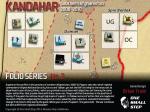Produktbeschreibung
A game on the conflict in this province of southern Afghanistan, 2008-10. Players take the role of regional commanders (Afghan National Security Forces and Taliban, yes not the ISAF) striving for the resources to allow them to earn Victory Points, which are granted in accordance with objectives set them by the same higher authorities that provide them with those resources. Players will find themselves in the position of having, if they wish to continue to get high levels of support, to follow courses of action that are maybe not the most effective in opposing the enemy but are more valued by their superiors, and which themselves change from time to time during the game. When you run out of support, the game ends – the war continues but with a different regional commander!
Game Design: Brian Train
Projected Contents:
1 16-Page Rules Book
140 half-inch full-color, die-cut counters
12 Objectives Cards
1 17x22 Map/Playing Surface
Charts and Tables
DESIGNER'S NOTES
Background
This game began life as a redesign of a game I designed in 2010. This game was similar to other games I had designed in the past, dealing with 20th Century counterinsurgencies in Uruguay, Peru, Algeria, Greece and Cyprus. The point of central interest in these games was the notion of the Political Support Level, in short the level of support, legitimacy, commitment or patience the non-military people involved in the conflict were willing to extend to the forces commanded by the players. The level was affected by many things, and games ended when one player ran out of political wherewithal and his level reached zero, signifying some kind of forced non-military conclusion to the conflict. The notion that the “hearts and mindsâ€¬Ě of the civilian population must be wooed, or at any point not blown out of a cannon, is conventional wisdom now and the Political Support Level was my way to model it.
As I worked on the design, I also started thinking about the nature of the conflict in Afghanistan. It seemed to me that the main dynamic of the conflict was not that of fighting for the allegiance of the civilian population, with one side representing the recognized and legitimated administration of the country as a whole and the other side a guerrilla movement with an ideological, or at any rate basically political grudge. I felt that after thirty years of constant internal violence abetted by frequent foreign interventions, with the addition of great social dislocation and rampant crime, the civilian population could no longer relate to its government in the same way as it did in my game models of conflicts in South America or the Mediterranean. Not only that, traditionally the Afghan people have never accepted a central government emanating from Kabul, still less a Jeffersonian-model democratic one such as the United States has tried to cultivate. On the other hand, no more than a small fraction of Afghans are willing to return to the days when the Taliban held power in the country. Finally, my aim was to present only part of the larger conflict for Afghanistan, where the other games had been models of national-level struggles.
I therefore thought it appropriate to drop the idea of the Political Support Level, replacing the main unit of “game currencyâ€¬Ě with the Support Point (SP). To the players, who now play the role of regional commanders and not national-level decision makers, SP are an abstraction of the amount of support the higher authorities to which the players are responsible are prepared to provide, representing both material and intangible resources. Players use SP to earn Victory Points, which are granted in accordance with objectives set them by the same higher authorities that provide them with those SP. Players will frequently find themselves in the position of having, if they wish to continue to get high levels of support, to follow courses of action that are not the most effective in opposing the enemy but are more valued by their superiors. Therefore, the Objective Cards contain some seemingly perverse incentives, where engaging the enemy in kinetic operations may actually take second place (especially for the Government player).
The game can end in several ways: at a fixed point in time, or if one player has demonstrated a significant and sustained lead in Victory Points, or when either player's SP level reaches zero. In the last case it is assumed that some crisis or decision point has been reached, play stops and players compare their respective totals of Victory Points (VP) to determine a winner. In truth, the war (and game) would go on, in the latter case with a different commander replacing the one who had exhausted the patience and resources of his superiors. It might be interesting, if players had time, not to end the game when an SP level zeroes out but instead switch roles, to see how they like it on the other side! (In this case, “resetâ€¬Ě the zeroed-out player with an SP total rolled from the Random Game Setup Chart (14.2) but do not change his units, deployments or Objective Card.)
It may also seem very cynical to allow Government forces to conduct Expropriation missions. Documentation and examples of ANA and ANP units selling equipment, taking kickbacks and bribes, and shaking down the local populace are one quick Google search away. And what about the opium harvest? It’s no secret that both sides profit enormously from it, as do the peasants who plant and harvest the poppies, and so have at least as great an incentive to let it continue as the criminal gangs do. Consider the SP gained from this procedure as not only personal enrichment by the personnel involved, but also the tacit encouragement by higher echelons to let it continue (as they profit from it too). Yet this comes at a price, reflected in the loss of Morale by players. |


